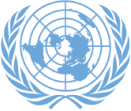The General Assembly, this most democratic and representative of United Nations organs, has served for almost six decades now as a forum in which all States, no matter their size or status, may address with equal voice issues of interest and concern to them as well as to the international community. It has indeed become the parliament of humankind.
To the President of the General Assembly, a distinguished son of Africa, now falls the task of guiding the deliberations of this fifty-ninth session. I would like to offer him my delegation’s warm congratulations and good wishes as he assumes his high responsibilities.
I would like to extend to the outgoing President, The Honourable Julian Hunte, our appreciation and thanks for his magisterial direction of the Assembly’s activities over the past year. His performance is a source of pride and satisfaction, not only to his native Saint Lucia, but also to the wider Caribbean community, to which both our countries belong. Allow me also to convey to the Secretary-General, Kofi Annan, our gratitude for his sure and steady leadership of the Organization during these tumultuous times.
The speakers who have preceded me in the debate have all expressed their preoccupation at the rising level of threat to global peace and security, as well as to our common economic and social security. Intense conflict in places such as Afghanistan, Iraq and elsewhere in the Middle East, Africa and Europe has destroyed thousands of innocent lives and wreaked havoc on the States involved. At the same time, despite the many promises of globalization, development continues to elude the majority of countries, especially the poorest and most vulnerable. The HIV/AIDS pandemic has not abated, continuously robbing us of precious human and financial resources. Altogether, the international scenario facing us is distressing, offering scant hope for early improvement. Like others, therefore, my delegation cannot help but state its concern at the ever-worsening international climate.
While most of our problems are man-made, many of our States, such as those in the Caribbean, must also face the constant threat of natural disasters. The recent wave of hurricanes that destroyed our sister State of Grenada and severely battered other island countries, such as Haiti, the Bahamas, Cuba, the Cayman Islands, the Dominican Republic and Jamaica, has shown how destructive the forces of nature can be to our development. The Government of Guyana extends its solidarity and support to all those afflicted, as well as to the United States of America, whose state of Florida has also been seriously struck. Such is the frequency of these phenomena that the international community must now seek to devise stronger and more responsive machinery to address their consequences. In this regard, Guyana attaches high importance to the outcome, next January, of the International Meeting to Review the Implementation of the Programme of Action for the Sustainable Development of Small Island Developing States, which will be held in Mauritius, and the World Conference on Disaster Reduction, in Kobe, Japan.
The scourge of terrorism has now reached such a scale that it has been aptly described as a third world war. Scarce resources must now be diverted from development to the war on terror. Yet the rampage of destruction continues unrestrained. The process under way to stem the illicit global trade in small arms and light weapons and to forge more effective international instruments against terrorism and transnational crime commands Guyana’s full support. We anxiously await the report of the United Nations High-level Panel on Threats, Challenges and Change, in the hope that it will offer practical recommendations for preserving global peace and stability. The time may have come, we believe, to fully implement the collective security system that is envisaged in the United Nations Charter.
The age of globalization and liberalization in which we now live has undoubtedly brought with it laissez-faire attitudes and policies that have seriously affected societies everywhere. Lawlessness and violence are the new order of the day, threatening to destroy established systems of governance, especially in weak States, as demonstrated by the recent interruption of the democratic process in Haiti, the newest member of our Caribbean Community (CARICOM), which has exacerbated social conditions in that country. The Inter-American Democratic Charter and, indeed, our own Charter of Civil Society for the Caribbean Community expressly condemn such breaches of democracy. Notwithstanding our concern at these developments, Guyana stands ready to help the fraternal people of Haiti overcome their social distress. CARICOM, of which both Guyana and Haiti are members, is currently coordinating our humanitarian assistance to the island.
Respect for the fundamental tenets of the United Nations is essential if we are to avoid conflicts. The Charter is clear in its proscription of the use of force except under the particular circumstances of Chapter VII. In this context, let me say that Guyana supports the reform of the Security Council through an expansion in the membership of both the permanent and non-permanent categories and a general improvement of its modus operandi. After careful deliberation and in an attempt to break the current logjam in the discussions, my Government has decided at this stage to support the aspirations of Brazil, India and an African State to permanent membership. We believe that their participation as developing States in the work of the Council will make that body more balanced, representative and, ultimately, more accountable to the Assembly for the maintenance of global peace and security.
For Guyana, as for the rest of the international community, the situation in Iraq continues to be a source of preoccupation. We would wish to see peace and stability quickly restored to that country and its people. Similarly, we urge an end to the suicidal conflict between Israel and Palestine and a return to negotiations leading to the creation of an independent Palestine and peaceful co-existence between the two States.
As conflicts and humanitarian crises such as the one in Darfur continue to multiply, the United Nations is being called to do more with less. We therefore call for the strengthening of regional arrangements, such as those of the Organization of American States and the African Union, acting in concert with the United Nations, to assist in the search for durable solutions to conflicts and disputes.
It is also imperative that we strive with greater determination to secure our economic development and social progress. For more than six decades now, the international community has diligently sought answers to the development dilemma, moving from one facet to another, from disarmament to basic needs, from economic growth to full employment, from partnership to national ownership and from good governance to the free market. Thus far, however, the various models of development followed have failed to achieve their goals. In the continuing exploration, this year’s Human Development Report has added culture to the list of crucial elements. As a small, multi-ethnic State, Guyana fully accepts this proposition and is committed to preserving the culture that has brought our nation together in service to our national development.
At the same time, we believe that cultural diversity is a contemporary reality and must be recognized by all States. Too often, strategies for peace and development ignore this reality with disastrous results. Not enough consultation and coordination are undertaken to ensure that programmes and projects are in keeping with nationally defined priorities and local circumstances. It is necessary, if failure is to be avoided, for there to be greater dialogue and cooperation in the planning process for development. National leadership remains a sine qua non for successful development and must be strongly supported by our development partners. In this spirit, Guyana renews its support for the New Partnership for Africa’s Development (NEPAD) and other such initiatives based on strong national leadership and full international cooperation.
President Lula of Brazil and the World Commission on the Social Dimension of Globalization are to be commended for calling this Assembly’s attention to two major challenges facing the international community today, namely, poverty and the inequities of globalization. Although we daily see on our television screens the emaciated faces of the hungry, we are yet to be stirred with the compassion and generosity of heart needed to relieve their misery. As globalization gains further ground, many more will fall victim to further marginalization, especially in small developing countries that are unable to take advantage of globalization. My own country has recently seen a devastating blow to its sugar industry, on which thousands of our people depend, as a result of trade liberalization and the reform of the European Union’s sugar regime. Unless small States like ours are provided with special and differential treatment, they will be excluded from the global economy.
Next year, the world’s leaders will meet to review the progress made in achieving the Millennium Development Goals (MDGs). All the indications are that there is hardly enough time to achieve our objectives. We can therefore ill afford to stand still. We must determine now what ought to be done to build and sustain momentum to meet the 2015 targets. Guyana’s experience has been that these are not likely to be achieved without sustained economic growth. Although we have sound poverty reduction and national development strategies in place, we know that success depends in fair measure on a fair and supportive international environment. We therefore urge that high priority be accorded to greater debt relief, the mobilization of development finance and the creation of equitable trading conditions to enable developing countries such as ours to achieve economic and social progress.
It must be realized, however, that the MDGs, although important and laudable, will not in themselves bring about comprehensive and sustainable development. They are but a subset of the development agenda, which must include, if it is to be successful, political, economic, social and environmental considerations. Without a holistic and well-coordinated approach, lasting solutions to our problems will not be found. It is for that reason that my Government continues to advocate the establishment of a new global human order based on genuine interdependence and partnership between developed and developing countries. We are at a point in time when terror, war, poverty and social chaos threaten to engulf all humanity. We therefore hope that when the relevant item comes before the Assembly next month, it will receive the further support of the international community.
Within recent years the United Nations has faced mounting criticism for its lack of responsiveness to global challenges and for its failure to be democratic in some of its decision-making. While there is often a rush to act on particular issues that are deemed important by some countries, much less attention is paid to the concerns of the vast majority. As a consequence, the credibility and even the legitimacy of the United Nations have been called into question. If that trend continues, the hard-earned prestige of the Organization will be debased and its effectiveness curtailed. There can be no worse danger to humanity than the rejection of multilateralism. We believe experience has now clearly shown that unilateralism cannot resolve the problems of our contemporary world. Only through joint endeavours can we hope to achieve the freedom from fear and the freedom from want to which all our peoples aspire.
As has been so aptly said, the United Nations may not take us to heaven but it can certainly save us from hell. Let us therefore renew our commitment to the high purposes and principles for which it stands.


